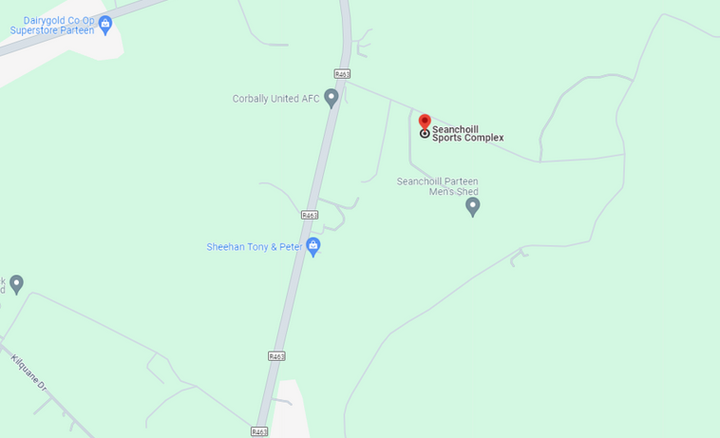Logo here














**Classes paused until February 3rd**
Eastern Martial Arts in the West of Ireland
Seanchoill Sports Complex,
Corbally Rd, Parteen,
Co. Clare,
Ireland
(Click on the map for directions)
Contact us:
info@shishudojo.com

What is Bujinkan?
Bujinkan Budo Taijutsu is a combination of historically traditional Japanese armed and unarmed martial arts that is relatively new in the West and is composed of 9 different ryuha (schools/doctrines). some of which date back as far as 1100AD. A historical ryuha is deemed 'kobudo' ('ko' meaning 'old', 'bu' meaning 'martial', and 'do' meaning way/method'. A kobudo ryuha is the progenitor of every traditional Japanese martial art that has since given birth to the modern ones that we know today like karate, kendo, aikido, judo etc.
Our training originated in Japan in the 1970s, when the 34th grandmaster of Togakure ryu ninpo taijutsu, Hatsumi Masaaki (pictured left), decided to combine 9 schools of ryuha (schools) that he had been taught by his sensei, Toshitsugu Takamatsu, who also went by the name 'Moko no Tora` - The Tiger of Mongolia (pictured below).
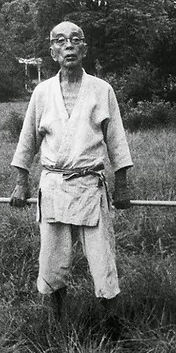
Takamatsu sensei learned the kobudo from three former samurai who had formerly worked for daimyo (Japanese lords) in 19th Century Japan; Ishitani Matsutaro Takakage, Toda Shinryuken Masamitsu, and Mizuta Yoshitaro Tadafusa. Each of these samurai were masters in their own right, and trained Takamatsu sensei (from age 9 until he was well into his 20's), after which he travelled to China to make his name. During this period, he dealt with several life-or-death conflicts as was somewhat common at the time, and also lent his skills to the police force on occasion. He returned to Japan in 1919 and began teaching his skills whilst still learning other ryuha, namely Kukishin ryu. Takamatsu sensei met Masaaki Hatsumi in 1957 when he was still only 26 years old. The young Hastumi committed to learn from Takamatsu sensei and stayed in his home when he travelled to train with him, and received menkyo kaiden (license of total transmission) from the now-elderly Takamatsu in multiple ryuha. In 1974, Hatsumi Soke created the Bujinkan; 'Hall of the Divine Warrior', which taught samurai martial arts and ninjutsu.
The 9 schools taught in the Bujinkan are:
-
Togakure Ryū Ninpō Taijutsu (戸隠流忍法体術)
-
Takagi Yoshin Ryū Jūtai jutsu (高木揚心流柔体術)
-
Shinden Fudo Ryū Dakentai jutsu (神伝不動流打拳体術)
-
Kotō Ryū Koppō jutsu (虎倒流骨法術)
-
Kuki Shinden Ryū Happō Bikenjutsu (九鬼神伝流八法秘剣術)
-
Gyokko Ryū Kosshi jutsu (玉虎流骨指術)
-
Kumogakure Ryū Ninpō (雲隠流忍法)
-
Gikan Ryū Koppō jutsu (義鑑流骨法術)
-
Gyokushin Ryū Ninpō (玉心流忍法)
Shaun Martin
Shidoshi of the Bujinkan Shishu Dojo
Shaun has trained since 2013 at the Bujinkan Namiryu Dojo in Harold's Cross, Dublin, and holds a 7th Dan rank under Alex Meehan Daishihan - one of the first Irish Daishihan to be granted by Soke Hatsumi Masaaki - before moving to Limerick in 2019. He became a licensed Bujinkan shidoshi in 2019 and opened the Limerick branch of the Bujinkan soon after.
Prior to taking up the Bujinkan Budo journey, he studied judo whilst in secondary school for 4 years under Sensei Padraig Harlow, and holds a 3rd Dan in World Taekwondo Federation Chang Moo Kwan (training and competing for 16 years under 8th Dan Grandmaster Jan Bartels in Roscommon, starting in 1995). After his school days, he taught Taekwondo in the Galway-Mayo Institute of Technology whilst studying science there. He has trained consistently in Irish martial arts schools for over 30 years.
Shaun has dedicated most of his life to martial arts studies and actively pursues training with national and international instructors, as well as direct students of Hatsumi Soke whilst in Japan.
Photography: Tom Clements
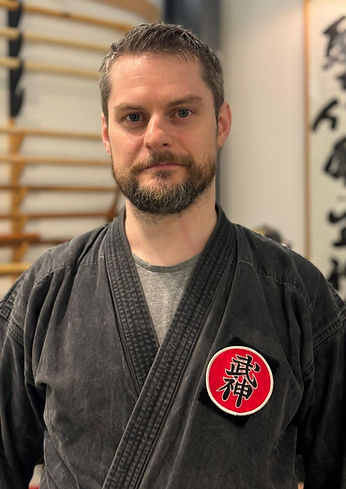
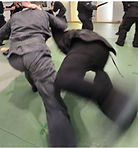
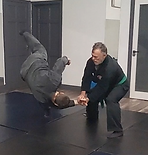
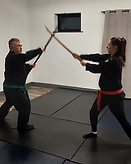

What We Study
At the Bujinkan Shishū dojo, we study sogo bujitsu - 'comprehensive martial arts'. We focus on punching, kicking, striking (with almost every part of the body), rolling/falling safely (ukemi), agility, strength, flexibiity and uke gata (receiving attack/technique). We also train in throwing, locking, suppression/submission, deception and opportunism in our kata. Additionally, we train in the use of the katana, 6 foot bo (rokushaku bo), 4.5 foot bo (jo) and 3 foot bo (hanbo/sanshaku bo). Occasionally we also employ the use of innovative weapons like the kusari fundo, jutte, yawara bo and shuriken (projectiles).
Ninja and samurai warfare also has a certain romanticism to their histories, being a major part of Japanese lore and warfare tradition. We learn how things were done back in Imperial Japan regarding class, caste systems, traditional clothing and rank in military outfits. Yoroi (armour) was also used in battle and we look into the use of techniques created to defeat armoured opponents.
Classes
When do we train?
Tuesday evenings: 8pm - 9.30pm
How do I join?
New students must undergo a beginners course which focuses on the main safety elements of Bujinkan, such as falling safely, rolling, correct techniques for punching/kicking/blocking, correctly handling weapons (i.e. katana), and correct distancing when using polearms (i.e. bo/staff). Please note that we openly welcome graded students from other Bujinkan dojos.
No previous experience in martial arts is needed; all equipment is provided for new students to use. The only items that are recommended to bring are loose (tough) clothing, a towel and water. There are changing and showering facilities on-site, as well as shop for tea/coffee/snacks. Uniforms, belts, footwear and crests can be sourced at a later date.
Please email info@shishudojo.com to enquire about when our next beginners course is starting.
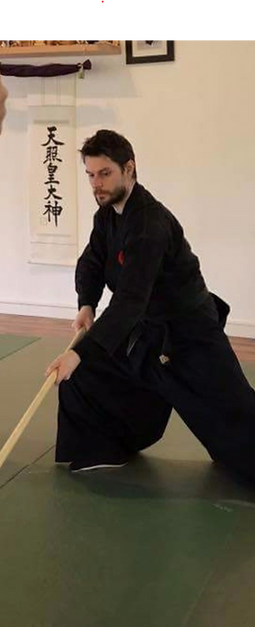

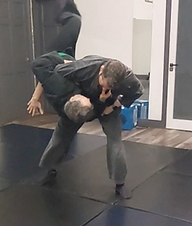
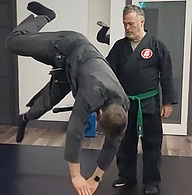
How To Get There:
Bus Routes:
O'Connor's Cross; 7 minute walk to dojo (Click image for best route options)
Route 345 - Limerick to Scariff via Killaloe
Transport for Ireland link: here




